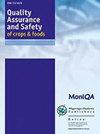两种温度下不同包装咸鸭蛋蛋白蛋白的质量变化及保质期
IF 5.3
3区 农林科学
Q1 FOOD SCIENCE & TECHNOLOGY
引用次数: 3
摘要
在两种不同的储存温度(30°C和40°C)下,用不同的包装(纸张对照、金属化低密度聚乙烯(M-LDPE)和聚对苯二甲酸乙二醇酯(PET))储存咸鸭蛋蛋白蛋白,在120天内检测其质量变化。每隔15天,检测蛋白霜的理化和微生物特性。包装类型、储存温度和储存时间都会影响蛋白霜的整体质量。本研究表明,在40°C保存的蛋白霜比在30°C保存的蛋白霜质量损失更大。在贮藏过程中,蛋白蛋白的亮度和黄度降低,红色增加,样品体积缩小。对照样本受到的影响明显大于其他病例。样品的重量、水分、aw和pH值在40°C保存的对照样品中最高。在所有情况下,随着储存时间的推移,硬度、咀嚼性、黏性、可破裂性、黏性和弹性等质地特征都有所下降,而黏性和回弹性则有所增加。M-LDPE和PET封装保持了样品的织构。样品的自由基清除能力没有显着差异,但在长期储存期间逐渐增加。对照样品的致病菌(大肠杆菌和沙门氏菌)和腐败微生物(酵母和霉菌)含量显著,将保质期缩短至90天。相比之下,M-LDPE和PET包装在120天的测试期内保持了样品质量。研究发现,M-LDPE和PET包装在30°C下比在40°C下更能延长蛋白霜的保质期。本文章由计算机程序翻译,如有差异,请以英文原文为准。
Quality changes and shelf life of salted duck egg white meringue stored in alternative packages at two temperatures
Salted duck egg white meringues stored in alternative packages (paper control, metalized low-density polyethylene (M-LDPE), and polyethylene terephthalate (PET)) and at two alternative storage temperatures (30°C and 40°C) were tested for changes in quality over a period of 120 days. Every 15 days, the meringues were tested for physicochemical and microbial qualities. Package type, storage temperature, and storage time all influenced the overall meringue quality. This study revealed that meringues kept at 40°C experienced more loss of quality than those kept at 30°C. During storage, meringue’s lightness and yellowness diminished while redness increased, and the sample volume shrunk. The control samples were significantly more affected than the other cases. The sample’s weight, moisture, aw, and pH were highest in the control samples when stored at 40°C. Textural profiles such as hardness, chewiness, cohesiveness, fracturability, gumminess, and springiness decreased in all cases with stor-age time, whereas adhesiveness and resilience increased. The M-LDPE and PET packages maintained the sample texture. The radical scavenging abilities of the samples did not significantly differ by the alternatives tested, but a gradual increase was noted during prolonged storage. The control samples had significant levels of pathogenic bacteria (Escherichia coli and Salmonella) and spoilage microorganisms (yeast and mold), reducing the shelf life to 90 days. In contrast, M-LDPE and PET packages maintained the sample qualities throughout the testing period of 120 days. It was found that M-LDPE and PET packages prolonged the shelf life of meringues when stored at 30°C, more so than at 40°C.
求助全文
通过发布文献求助,成功后即可免费获取论文全文。
去求助
来源期刊

Quality Assurance and Safety of Crops & Foods
FOOD SCIENCE & TECHNOLOGY-
CiteScore
4.60
自引率
7.50%
发文量
61
审稿时长
1 months
期刊介绍:
''Quality Assurance and Safety of Crops & Foods'' is an international peer-reviewed journal publishing research and review papers associated with the quality and safety of food and food sources including cereals, grains, oilseeds, fruits, root crops and animal sources. It targets both primary materials and their conversion to human foods. There is a strong focus on the development and application of new analytical tools and their potential for quality assessment, assurance, control and safety. The scope includes issues of risk assessment, traceability, authenticity, food security and socio-economic impacts. Manuscripts presenting novel data and information that are likely to significantly contribute to scientific knowledge in areas of food quality and safety will be considered.
''Quality Assurance and Safety of Crops & Foods'' provides a forum for all those working in the specialist field of food quality and safety to report on the progress and outcomes of their research.
 求助内容:
求助内容: 应助结果提醒方式:
应助结果提醒方式:


